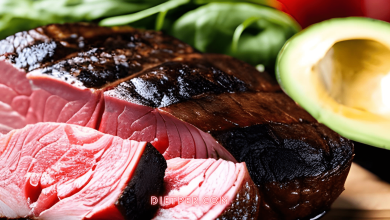Unlocking the Secrets of the Peter Attia Diet
Exploring the Peter Attia Diet: What You Need to Know

The Peter Attia Diet has become increasingly popular in recent years, with many people claiming it has changed their lives for the better. Dr. Peter Attia is a medical doctor who is known for his work in the fields of longevity and nutrition. He has developed a diet that is based on the latest scientific research and focuses on providing the body with the right nutrients to promote optimal health and longevity. The Peter Attia Diet is not just a weight-loss program, but rather a comprehensive lifestyle approach that can help you achieve optimal health and well-being.
The Peter Attia Diet
The Peter Attia Diet has gained significant attention in recent years as a unique approach to nutrition and overall health. Named after Dr. Peter Attia, a prominent physician and longevity expert, this diet focuses on optimizing metabolic health and achieving sustainable weight loss.
Unlike many fad diets that promote quick fixes or extreme restrictions, the Peter Attia Diet takes a comprehensive and science-based approach. It emphasizes the importance of understanding individual metabolic profiles and tailoring dietary choices accordingly.
At its core, the Peter Attia Diet revolves around the concept of a low-carbohydrate, high-fat (LCHF) diet. This means reducing consumption of processed carbohydrates, such as refined sugars and grains, while increasing intake of healthy fats, such as avocados, nuts, and olive oil.
By limiting carbohydrates, the diet aims to shift the body’s primary energy source from glucose to ketones. This metabolic state, known as ketosis, has been shown to have various benefits, including improved insulin sensitivity, enhanced mental clarity, and increased fat burning.
However, it is important to note that the Peter Attia Diet is not a one-size-fits-all approach. Dr. Attia emphasizes the significance of individual variations in metabolic health and encourages personalized experimentation to find the optimal macronutrient ratios for each person.
Furthermore, the Peter Attia Diet goes beyond just macronutrient ratios. It emphasizes the quality of food choices, promoting whole, unprocessed foods and discouraging reliance on highly processed and artificial products.
Who is Peter Attia and what is his approach to nutrition?
Peter Attia is a renowned figure in the field of health and nutrition. He is a medical doctor, researcher, and one of the leading voices in the realm of longevity, metabolic health, and performance optimization. With a background in surgery and a deep passion for understanding the intricacies of human physiology, Attia has dedicated his career to exploring the science behind nutrition and its impact on our health.
Attia’s Nutrition Approach
Individualized Nutrition: Rooted in the belief that there’s no universal nutrition approach, advocates for a personalized strategy considering an individual’s metabolic profile, genetics, and health goals.
Understanding Macronutrients: Highlights the importance of comprehending macronutrients—carbohydrates, fats, and proteins—and moves away from labeling all carbohydrates as detrimental. Encourages focusing on nutrient-dense, whole-food carbohydrate sources and recognizing the significance of healthy fats and proteins for optimal health.
Blood Sugar and Insulin Management: Stresses the significance of stable blood sugar levels and reducing insulin spikes. Recommends a low-carbohydrate, high-fat (LCHF) or ketogenic diet to shift the body’s primary fuel source from carbohydrates to fats, entering a state of ketosis for improved metabolic function.
Principles of the Peter Attia Diet
Metabolic Flexibility: Emphasizes the body’s ability to switch between fuel sources (fat and carbohydrates) efficiently, enhancing fat utilization for improved energy and potential weight loss.
Nutrient Density: Encourages the consumption of foods rich in essential nutrients like vitamins, minerals, and antioxidants, providing the body with the building blocks for optimal health and function.
Minimizing Inflammation: Targets chronic inflammation linked to health issues by promoting anti-inflammatory foods and reducing pro-inflammatory substances like refined sugars and processed oils.
Foods to include and avoid on the Peter Attia Diet
The Peter Attia Diet is a popular eating plan that focuses on optimizing health and longevity. It emphasizes consuming nutrient-dense foods while avoiding processed and refined options. To adhere to this diet, it is important to know which foods to include and which ones to avoid.
Nutrient-Dense Whole Foods
- Emphasizes fresh fruits and vegetables, providing essential vitamins, minerals, and antioxidants. A varied color palette ensures a broad spectrum of nutrients.
Lean Protein Sources
- Encourages poultry, fish, eggs, and plant-based proteins (legumes, tofu) to support satiety, muscle growth, and overall bodily functions.
Healthy Fats
- Crucial inclusion of avocados, nuts, seeds, and olive oil to provide essential fatty acids, promoting heart health.
Foods to Avoid or Limit
- Processed and Refined Carbohydrates: Minimize your intake of white bread, sugary cereals, and pastries to prevent blood sugar spikes and ensure higher nutritional value.
- Highly Processed and Sugary Snacks: Avoid these snacks, laden with additives, preservatives, and unhealthy trans fats. Opt for whole, unprocessed alternatives for better health.
Peter Attia’s Nutrient-Packed Meals
Lunch
At midday, Peter Attia opts for a nutrient-dense plate. Picture lean proteins taking center stage – perhaps poultry or fish, a robust source of amino acids. Paired with an array of colorful vegetables, delivering essential vitamins and antioxidants. Healthy fats, like avocados or nuts, make a notable appearance, contributing to the meal’s satiety and overall nutritional richness.
Dinner
As the day winds down, Peter Attia’s dinner continues his nutritional strategy. Expect a well-balanced composition featuring another round of lean proteins, vibrant vegetables, and healthy fats. The emphasis remains on whole, unprocessed foods, with an eye on optimizing metabolic function and promoting overall health. The dinner table mirrors the lunch philosophy – a symphony of flavors and nutrients for sustained well-being.
Decoding Dr. Peter Attia’s Health Supplements
Dr. Attia’s approach to supplements is dynamic, adapting to his ever-changing health needs. Here’s a detailed breakdown of the supplements he often mentions, with considerations based on whether he’s in a fasting state:
Dr. Peter Attia’s Comprehensive Supplement Strategy
- Magnesium (400 mg/day): Forms: Magnesium sulfate and magnesium oxide. Purpose: Preserving potassium for cellular function. Introduced Slow-Mag in 2018 for gradual release.
- L-Threonate: Purpose: Facilitating magnesium transportation to the brain, contributing to cognitive health.
- Methylated B Vitamin Complex: Purpose: Addressing a genetic mutation affecting folic acid processing.
- Medium-chain triglyceride (MCT) Oil (30 ml in the morning): Purpose: Aiding ketone body production, serving as an energy source during fasting.
- Omega-3 Fish Oil (10 mL with dinner daily): Purpose: Targeting inflammation reduction and supporting heart health.
- Amino Acid – Glutamine and BCAA: Purpose: Enhancing muscle building and preservation.
- Vitamin D3: Purpose: Fostering muscle growth and improving bone density.
For Sleep
- Magnesium L-Threonate (2 capsules – Magtain): Purpose: Inducing drowsiness.
- Glycine (2 grams): Purpose: Calming the central nervous system.
- Ashwagandha (600 mg): Purpose: Reducing cortisol levels and improving sleep onset.
- Phosphatidylserine (Jarrow Formulas PS-100 – only for jet lag): Purpose: Potential cortisol suppression during jet lag.
Exploring Peter Attia’s Endorsement of Intermittent Fasting
Dr. Attia advocates intermittent fasting as a preferable alternative to caloric restriction, steering people away from the Standard American Diet (SAD). In a 2020 podcast, he emphasized the fasting goal of triggering autophagy, a process where the body breaks down dysfunctional cells.
While we can’t directly measure autophagy, its occurrence is closely tied to the presence of ketones in the body. The underlying aim of both keto diets and fasting is to induce autophagy for cellular repair. Researchers believe that eliminating cellular debris and mutated cells could enhance health and extend lifespan, as longevity correlates with reduced accumulation of damaged cells.
Achieving this cellular rejuvenation typically requires around 16 hours of fasting, making the 16/8 fasting method particularly popular among proponents of longevity.
Unlocking the World of Fast-Mimicking Diets
While Dr. Attia embraces fasting, he sheds light on fast-mimicking diets, which encompass:
- Alternate Day Fasting: Involves abstaining from regular eating every other day. This may include a strict approach of consuming nothing on fasting days or a more common hypocaloric day with limited calorie intake.
- 3-Day and 7-Day Fasts: Encompasses limiting calorie intake for a specified fasting period, typically with reduced calories on fasting days, ranging up to 700 calories.
- Water Fasting: Consuming only water or tea (and essential minerals) with no caloric intake for three to seven days.
Benefits and Potential Drawbacks of the Peter Attia Diet
Benefits of the Peter Attia Diet
- Weight Loss Promotion: By reducing carbohydrate intake and increasing healthy fats, the diet encourages the body to use stored fat for energy, aiding in weight loss and fat mass reduction.
- Improved Insulin Sensitivity: The diet may enhance insulin sensitivity and blood sugar control, benefiting individuals with diabetes or insulin resistance.
- Cognitive Function Enhancement: Research suggests that the high-fat, low-carb approach supports brain health by providing a steady supply of ketones, potentially improving cognitive performance, memory, and focus.
Potential Drawbacks
- Restriction of Carbohydrates: Eliminating or severely limiting carbohydrates, the body’s primary energy source, can lead to low energy levels, fatigue, and challenges in sustained physical activity.
- Concerns About Cardiovascular Health: The high-fat nature of the diet raises concerns about cardiovascular health. Excessive saturated fats may increase the risk of heart disease if not balanced with healthy fats.
Common Misconceptions and Criticisms of the Peter Attia Diet
The Peter Attia Diet has gained popularity in recent years, but like any diet, it also faces its fair share of misconceptions and criticisms. It’s important to address these concerns to comprehensively understand the diet and make informed decisions about whether it is right for you.
- Misconception 1: The Peter Attia Diet promotes excessive fat consumption. While it encourages a higher intake of healthy fats, it does not advocate for unlimited fat consumption. The emphasis is on consuming healthy fats in moderation and balancing them with other essential nutrients.
- Misconception 2: The diet severely restricts carbohydrate intake. Critics argue that carbohydrates are an essential energy source, and cutting them out completely can lead to nutrient deficiencies and low energy levels. However, the diet does not eliminate carbohydrates but focuses on consuming them in controlled amounts from whole, unprocessed sources, such as fruits, vegetables, and whole grains.
FAQs
1. What foods does Peter Attia avoid?
Attia previously avoided sugar, processed foods, and starch, limiting fruit intake to small berry amounts with lower fructose content. Over time, his approach shifted, and he introduced occasional starches like potatoes into his diet.
2. What are Peter Attia’s “four horsemen” of chronic disease?
Attia identifies atherosclerotic diseases, cancer, neurodegenerative diseases like Alzheimer’s, and foundational diseases such as fatty liver disease and type 2 diabetes as the “four horsemen” of chronic disease.
3. How to live a longer higher quality life by Peter Attia?
Dr. Attia advocates further research on longevity supplements, discussing NAD, Metformin, Rapamycin, Dasatinib, and Quercetin in low doses for eliminating senescent cells, emphasizing a cautious approach for a deeper understanding of their impact on longevity.
4. What does Peter Attia eat daily?
The Peter Attia Diet offers a personalized approach to health, blending science with practical dietary choices. While effective for many, it may not suit everyone, emphasizing the need for consultation, especially for those with specific health conditions. Tailoring macronutrient ratios, intermittent fasting, and whole-food choices, this diet is a beacon for those seeking a comprehensive and personalized path to long-term well-being.





